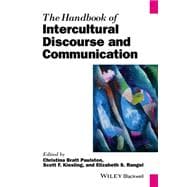Intercultural discourse and communication is emerging as an important area of research in a highly globalized and connected world, where language and culture contact is frequent and cultural misunderstandings and misconceptions abound. The handbook contains contributions from established scholars and up-and-coming researchers from a range of subfields to survey the theoretical perspectives and applied work in this burgeoning area of linguistics.
This timely volume features first a part that introduces the background detailing the scope and topics of the field; followed by one that describes four different theoretical approaches and their basic research questions, from Ethnography of Speaking and John Gumperz’s Interactional Sociolinguistics to Critical Approaches and Postmodernism. The third part, “Interactional Discourse Features,” describes and explains the features of talk that are frequently studied in cross-cultural research, such as turn-taking and politeness. The volume also includes a section on Interactional Discourse sites, examining cross-cultural communication (such as Greek-Turkish discourse).
The final part considers a variety of domains in which interaction takes place, such as Translation, Business, Law, Medicine, Education, and Religion.








